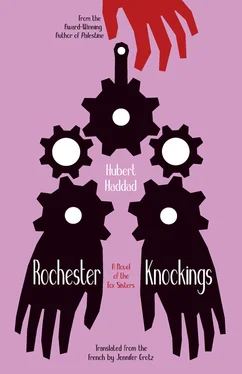Unaware of the disorders of politics and finance, Kate spent the war in her little island of green, preoccupied only with what was expected of her. As she did each morning, despite the coldness of the air, she left the mansion first thing, curious about the dying colors of the Portland roses, the scarlet Rembrandts, or the dwarf double-blooms with the ridiculous name of Pompon Perpétuel. The autumn roses were certainly the most exquisite. Mr. Livermore left her free to roam at this hour — during the week a carriage would have already delivered the banker to Wall Street — but it was her pleasure to go visit the manor house, a large colonial building on two floors with an exterior staircase and peristyles, in order to have lunch or tea and cookies in the office, in the company of the cook, an old Caribbean vendor of roast meats, and sometimes with the Jamaican gardener who came swigging a jug of fresh water. The other employees of the house, a German chamber maid with six arms, a Calabrian porter, and Mrs. McCords, a housekeeper with multiple functions, kept their distance from her, one of them out of superstition, the others from jealousy or mistrust. By far the oldest servant of the mansion, the cook told what she knew whenever she felt like it, by instinct and even bluntly, without taking the time for clarifications, considering the least question indiscreet. Kate gladly listened to her while contemplating the tea leaves at the bottom of her cup or the flames licking the throat of a huge cast-iron stove with its two ovens and three cooktops. From distracted scraps of conversation or obsessed soliloquies, she had gleaned much more from the cook than from the small tearful confidences of the widower.
Estelle had been a young woman of the Southern aristocracy, daughter of a Tennessee plantation owner, a man with opinioned ideas who employed a good thousand slaves flanked by a militia that was under his thumb. She had fled her town and family after being forced to attend the public hanging of a runaway slave that she had seen fit to help. Cursing any affiliation with them, Estelle reached New York by railway where Mrs. McCords, a relegated parent, received her without too much grumbling. Through the involvement of the latter, an educated woman who, in addition to her good company, served as his private secretary, the financier was one day put in the presence of Estelle. He was immediately smitten to the point of reforming all his old ideas for her and investing considerable sums in the anti-slavery struggle. It was a few months before the default election of Jefferson Finis Davis as president of the Confederacy. The battle of Fort Sumter hadn’t yet taken place, but with Lincoln surrounded in Washington, the outrage did not weaken after the hanging of John Brown, the radical abolitionist hero who led his own army, ten men strong, again the federal arsenal of Harpers Ferry in Virginia.
In the context of dislocation from clan and family ties that augured dark days, the marriage of Estelle and the financier undoubtedly participated in the social upheaval underway. But neither the ostracized young wife nor Charles Livermore lived those hours on the planet any differently than Adam and Eve. Although he was her senior by more than twenty years, Estelle still found herself loving him with an ever-increasing amazement. Nobody in the world could have shown her such a tender, soothing, and sensual attention. In the face of this ever-present sun, the many treasures of seduction that he lavished on her in the name of attraction had, in contrast, the pallor of a moon. Always available despite the ups and downs of the profession of international trader, Livermore loved Estelle like an absolute, without intelligible comparison. Everything that was not her had almost no value, his own life included. The exacerbated passion of love took on an almost quasi-cannibalistic aspect in him — covering her with kisses, he had to restrain himself from nearly devouring his wife. The businessman gave the impression of being present everywhere around her; the better to adore her, he would certainly have abandoned his fortune in exchange for being able to be ubiquitous. At the mansion, there was alarm at his metamorphosis into a tribe of gallant ogres. Joyful but languid, Estelle lost her strength. The more she abandoned herself to the devouring love of her husband, the less she offered resistance to the seasonal illnesses and other maladies. She took to bed one icy and snowy day. The doctors diagnosed a galloping consumption. She died without lament after having called the staff of the mansion to her bedside to declare solemnly that no human being would ever be loved like her.
Livermore had a kind of igloo built on a hill in the immense park, and until snowmelt kept vigil night and day over the dead woman wrapped in an ermine cloak. He had a grave dug in the same spot in the park, and built on top of it a tall chapel of white marble, an altar window on either side, an alabaster angel, and a statue of John Calvin. In his outfit typical of the Renaissance era, Calvin had Livermore’s exact traits, at least his profile looking at the other figure. Kate, who’d been led here on her second day by the Jamaican with the cockney accent, assimilated all at once the angel that was Estelle. This image of beauty offered by the rock’s durable phosphorescence left her confused, in an enigmatic silence. Nothing came to her anymore from the world nearby. No one had the thought to inform her of the assassination of President Lincoln, let alone the recent crimes in Estelle’s hometown of an organization of former Confederate soldiers with a name like a Mongolian tribe. Kate felt the atmosphere of places with a pathological acuity; decidedly nothing of her interlocutors’ mental states escaped her. She could endure the martyrdom of Saint Sebastian in front of the tree flayed by lightning or of Saint Stephen finding some frog stoned by a scamp. Kate refrained from this sensitivity in isolation; she turned by predilection to places free of any influence and to beings manifesting a healthy indolence, like the cook or the gardener, who was dumb but not deaf. Attentive to her desires, and perhaps to her thoughts, he helped the young woman be less of a foreigner in this place devoted to the worship of a dead woman.
Charles Livermore, for his part, divided himself into two mental planes, his body coming and going. The Wall Street financier, handicapped in no way in his abstract operations, would fall back into a great melancholy upon returning to the mansion, ready for any of the mantic arts to touch the illusion of a relic. Lost in a Kabbalah of signs, his meeting with Kate Fox, one year after losing Estelle, had seemed to him a good omen. This young woman had given him the look from the beyond. He sought out mediums in vain in New York, Boston, or Rochester: all betrayed a prosaicism and even a vulgarity of the soul incompatible with his needs. The charlatans among them, easily visible, boasted the gifts both of mediumship and hypnotism, a Janus with a twisted neck. The authentic psychics, he’d figured out over time, were only passive intercessors, simple transmission belts; many were recruited from the washers of corpses or uneducated cowboys, assuredly the ones most apt at annihilating consciousness and will in themselves. It was, however, impossible for him to conceive of a communication with the world beyond via an unbalanced person, or some crook or ecstatic moron. Aside from her reputation, Kate had immediately attracted him by her quality of presence, a childlike simplicity and a graceful charm so close to the core of his memory of Estelle. Livermore had a pretty keen awareness of her nervous condition, but her melancholy was a refuge for him and it mattered little to him that insane asylums these days were teeming more with spiritualists than syphilitics.
Читать дальше












